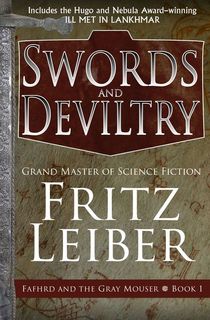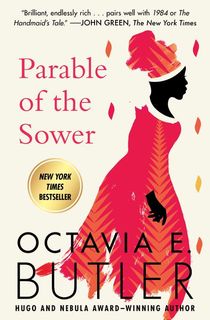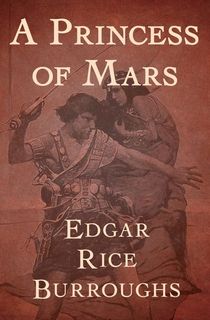Dungeons & Dragons isn’t ashamed to admit that it borrows heavily from its favorite inspirations, to the point that the world and lore of D&D is almost a living fan-fiction based on its creators’ favorite readings. All of the books on this list are noted as inspirations in the 5th Edition Player’s Handbook, or have been mentioned by the creators themselves as influences. How many have you read?
1.

Lord of the Rings
Let’s get this one out of the way, because it’s arguably the biggest one. The original creators of D&D, like most of modern fantasy, looked at Tolkien’s millennia-spanning history, well-developed fictional races, and heroic tales of an unlikely crew of heroes facing a dark lord and said (essentially) "yes, let's steal that."
Everything from the Halfling race (which had to be renamed from ‘Hobbit’) to treants (based on ents) to the idea of a party of adventurers with varying skills (a Ranger, a Wizard, a Fighter, etc.) can be found in The Lord of the Rings, even 40 years later. Dwarves, Orcs, and Elves all follow Tolkien’s description, and so does the ‘epic fantasy’ style of game outlined in the Dungeon Master’s Handbook, in which players go on a journey to fight an evil that threatens the world.
2.

Swords and Deviltry
Sword and Deviltry is one of the iconic pieces of sword and sorcery, a genre of fantasy that relies more on episodic, swashbuckling adventurers rather than an overarching, epic journey to fight a world-threatening evil. It’s hard to overstate the influence of Lieber on fantasy and D&D, partly because his stories are one of the archetypal templates for a D&D adventure.
Fritz Lieber’s famous duo of Fahfrd and the Grey Mouser are shining examples of the Rogue and Barbarian classes, and their status as swords-for-hire contrasts with heroes who fight for justice and honor. Instead, the pair are after the same thing as many D&D players—gold, treasure, and adventure.
3.

Parable of the Sower
Parable of the Sower may seem like a strange addition to this list, due to its reputation as a landmark piece of fiction in the sci-fi genre, not fantasy. The story centers on Lauren Oya Olamina, a young empath who grows up in a fictional 2020s America ripped apart by climate change and wealth disparity. Over the course of the book, she becomes the leader of a new movement focused on settling other planets, called “Earthseed.”
As Mike Mearls, head of research and design for Dungeons & Dragons, told Forbes: “Parable of the Sower is probably my favorite work of speculative fiction. While it is set in a near future, modern world, the themes of community building and survival are very D&D."
4.

A Princess of Mars
To today’s readers, A Princess of Mars is a bizarre mish-mash of sci-fi and fantasy. The story begins during the American Civil War with the protagonist, John Carter, being transported to Mars (known as “Barsoom” in the book). There’s another twist, though: due to the gravity on Mars (and some other convenient circumstances), Carter is essentially Superman. Fighting a host of terrifying and strange monsters with sword and pistol, he must win the love of the Martian princess Dejah Thoris.
Upon its release, A Princess of Mars became a massive hit and a hugely influential book for both sci-fi and fantasy writers. When it comes to D&D, the influence is pretty clear: Princess is about travelling to exotic locales, battling monsters, and a hero who possesses abilities beyond the ordinary.
5.

The Complete Fiction of H.P. Lovecraft
These days, players only need to look at the map of the D&D Multiverse to see Lovecraft’s influence: beyond the Inner and Outer Planes there lies the Far Realms, filled with Lovecraft’s signature concepts: unknowable, nightmarish forces that warp magic and living beings, sights and knowledge that drive mortals insane, and bizarre beings who whisper maddening truths to anyone who will listen.
Apart from that, the squid-faced “mind flayer” is an obvious homage to Lovecaraft’s now-famous Cthulhu, and spells like “Black Tentacles” and “Hadar’s Hunger” hint at Lovecraft’s favorite touchstones: aquatic monstrosities and shadowy monsters that lurk somewhere between dimensions. Volo’s Guide to Monsters, a supplement book for 5th edition, even has a plot hook for an adventure inspired by "Shadows over Innsmouth," a classic Lovecraft tale…and it’s part of an ongoing Lovecraftian storyline that’s been around since 1998.
RELATED: 8 Scary Creatures from Sci-Fi Books
6.

A Wizard of Earthsea
You could say A Wizard of Earthsea is about how Ged, a blacksmith’s boy from a small village, became a powerful Archmage. But though there are dragons, powerful spells, and strange lands, the story of Wizard is really about an arrogant, ambitious kid who becomes a wiser, if more scarred, man. That journey has since become the template for how adventurers become heroes in D&D.
According to Mike Mearls: "Aside from the literary strengths of her work, [Le Guin] captures the rise of a legendary figure from humble beginnings to the heights of power in a way that I really love." Recently, a new form of wizard, the Onomancer, was introduced, and it bears a striking resemblance to Le Guin’s name-based mages.
RELATED: 9 Essential Ursula K. Le Guin Books
7.
.jpeg?w=640)
The Coming of Conan the Cimmerarian
The Coming of Conan is a collection of some of the earlier tales in the Conan series, including The Black Colossus and Queen of the Black Coast. All of them revolve around Conan, the unflappable and unkillable wandering barbarian who finds sorcerers to kill and beautiful women to save everywhere he goes.
Within Conan the Barbarian, D&D finds not only its archetype for the Barbarian class, but a template for the larger world of adventure players find themselves in: there are kingdoms in danger, ruins to explore, and exotic lands to visit. Conan is the archetypal adventurer, a wandering hero who relies on his resourcefulness and deadly skills to complete quests given to him, which often involve plumbing the depths of forgotten and dangerous temples filled with cultists, evil magic, and monstrous creatures.
8.

The Sword of Welleran
Most fans of fantasy won’t even recognize the name Lord Dunsany, but there was a time when the genre was dominated by him and his work, similar to Tolkien or George R.R. Martin today. Lord Dunsany was the king of the fairy-story (the precursor to modern fantasy), and The Sword of Welleran is one of the most influential stories of its age.
The story of The Sword of Welleran speaks to the central premise of D&D, and goes something like this: a youth takes up the cloak and sword of a legendary hero, gaining his powers and martial prowess and defending a wondrous city from a horde of invaders. It’s what every kid imagines when they sit down at the table with a character sheet and dice.
However, Sword isn’t a flowery celebration of violence and heroism—it’s a melancholy meditation on how legends are carried on, how the glorious past can never be reclaimed, and how battle can turn from bloody triumph to wholesale slaughter.
9.

Bulfinch's Mythology
From minotaurs to manticores, D&D is studded with creatures from myths. There’s a reason for that: fantasy as we know it today grew from legends and folklore, especially European tales. D&D’s creators raided all kinds of old stories to populate their game with monsters to fight, and the go-to book for mythology buffs for decades was Bulfinch’s Mythology. Some creatures, like the fire giant on the cover of the Player’s Handbook, are lifted directly from Norse mythology and other traditions.
In addition to monsters, Mythology used to be the gold standard for those interested in ancient tales, whether it was the stories of King Arthur or the adventures of Beowulf. Within these tales, readers can find the bedrock that fantasy (and D&D) is based on: spells, dragons, wizards, and heroes who defend the boundaries of their realm from beings that lurk in the dark and wilderness. Now, in 5th edition, rangers are specifically described as those who defend the edges of civilization from primal threats.
10.

Name of the Wind
Name of the Wind has become one of the new modern classics of fantasy, and it’s carried by the character of Kvothe, a multi-talented musician, mage, performer, and eventual innkeeper. Kvothe’s rags-to-riches arc propels him from being a traveling performer to an acolyte of one of the most prestigious academies of magic, then on to become a legendary hero of the realm.
First and foremost, Kvothe is a bard, and bards have a rocky history in D&D. Because they were neither a strong spellcaster or a particularly competent warrior, bards used to be the worst of all worlds when it came to choosing a class. According to Mearls, Patrick Rothfuss "showed that bards didn’t have to suck. We actually talked about using words of power as big element of the bard, but toned it down as too on the nose."
[via Forbes.com]
This post is sponsored by Open Road Media. Thank you for supporting our partners, who make it possible for The Portalist to continue publishing the sci-fi and fantasy stories you love.




.jpeg?w=640)


